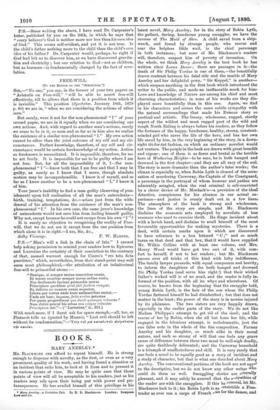FREE-WILL.
[To THE EDITOR OF THE "Sracraion.") S11,—" No one," you say, in the former of your two papers on " Aristotle on Free-will," " will be able to assert free-will
effectively, till he allows that there is a position from which it is invisible." This position (Spectator, January 18th, 1879 p. 80) we are in, " when we are considering the actions of other men."
But surely, were it not for the non-phenomenal "I" of your second paper, we are in it equally when we are considering our own actions. And, with regard to another man's actions, surely we cease to be in it, so soon and so far as in him also we realise the existence of a similar non-phenomenal " I." My own action cannot be other than the joint outcome of my self and my cir- cumstances. Perfect knowledge, therefore, of my self and cir- cumstance would be certain foreknowledge of my action. Action so foreknown is necessitated. It is impossible, therefore, for me to act freely. It is impossible for me to be guilty where I am not free. But, for all the impossibility of it, I—the non- phenomenal " I "—know both that I am free and that I may be guilty, as surely as I know that I move, though absolute motion may be incomprehensible. I know it of myself, and so far as I know another to be a non-phenomenal " I," I know it of him.
Your juror's inability to find a man guilty (deserving of pun- ishment) upon full realisation of all the man's antecedents— birth, training, temptations, &c.—arises just from the with- drawal of his attention from the existence of the man's non- phenomenal "I." In his own case, the same juror's knowledge of antecedents would not save him from feeling himself guilty. Why not, except because he could not escape from his own "I " ? It is surely no objection to recognising the reality of Free- will, that we do not see it except from the one position from which alone it is in sight.—I am, Sir, &c.,
P.S.—" Man's will a link in the chain of fate." I cannot help asking permission to remind your readers how to Epicurns and Lucretius the certainty of their conviction to the contrary
of that, seemed warrant enough for Cicero's " res tote ficta pneriliter," which, nevertheless, from their stand-point may well seem most philosophical,—the attribution of an infinitesimal free-will to primordial atoms :—
" Denique, si semper motas conectitur omnis, Et vetere exoritur semper novas ordine certo, Nee declinando faciunt primordia motas Principium quoddam quad fati foedera rump at, Ex infinito no causam cause sequatur, Libera, per terms uncle haeo animantibus exstat,— Undo est baec, inquam, fatis avolsa potestas Per quam progredirnur quo ducit quemque voluntas? Nam dubio procul his rebus sua cuique voluntas Principium dat."—(" Lucretius," ii., 251.)
With much more, if I durst ask for space enough,—all, too, as Plutarch tells us (quoted by Munro), "Lest evil should be left
without its condemnation,"—‘Twip 1.4t) set:mambo eiviravor zilr xeoclay.


































 Previous page
Previous page